SM Group elevates risk management strategies through development of sustainable, resilient communities
Written by: Annelle Tayao-Juego
Resilient infrastructure, connected communities, renewable sources of energy, social inclusion, an increased availability of risk information, and sustainable financing solutions – all backed by strong partnerships between the government and private sector.
These are the drivers that the SM Group has identified as key in creating sustainable development pathways, building collective resilience, and contributing to a more liveable planet amid the urgent threats posed by climate change.
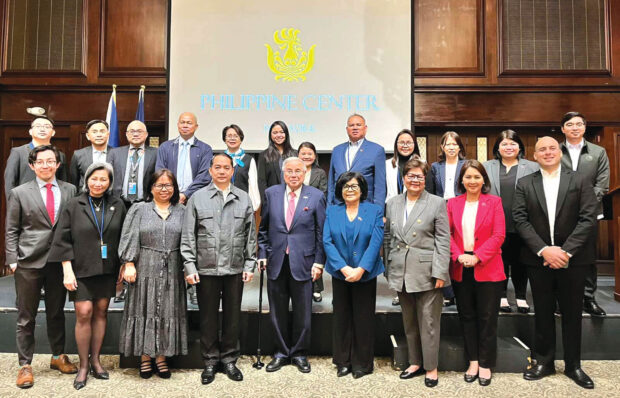
Philippine Delegation to the UNDRR Midterm Review of the Sendai Framework
The Filipino conglomerate was the sole representative of the Philippine private sector in the recently concluded High-Level Meeting (HLM) on the Midterm Review of the Implementation of the Sendai Framework 2015-2030 (MTR SF) held last May 18-19 at the United Nations (UN) Headquarters in New York.
Following the theme “Working Together to Reduce Risk for a Resilient Future,” the HLM sought to provide a platform for UN Member States, partners, and stakeholders to reflect on the enablers and challenges observed since the 2015 adoption of the Sendai Framework, and to formulate a forward-looking and risk-informed international approach towards sustainable development beyond 2030.
SM, a leader in resilience and sustainability
As part of an ecosystem of sustainable businesses that strives to enrich the lives of millions of Filipinos, Jessica Bianca Sy of SM Development Corporation (SMDC) and Hans T. Sy of SM Prime Holdings Inc. brought the Philippine private sector’s voice to the HLM – reinforcing their commitment to put disaster risk reduction (DRR) as one of their core strategies, sharing best practices that underpin quality of life and social well-being, and advocating for the implementation of policies and initiatives that will help create a sustainable future for all.
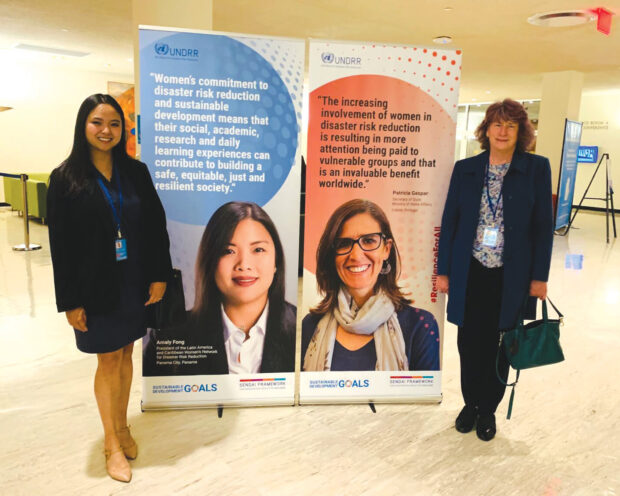
Jessica Bianca Sy of SMDC, Dr. Mary Picard of Humanitarian and Development Consulting in Australia
SMDC’s Jessica Sy represented the Philippines in the Leaders’ Roundtables on Resilient Infrastructure Systems, which was co-chaired by Pramod Kumar Mishra, Principal Secretary to the Prime Minister of India and Martin Ociepa, Secretary of State, Ministry of National Defence, Poland.
Meanwhile, Hans Sy, provided advice on the importance and role of the private sector in DRR and consulted with the Private Sector Alliance for Disaster Resilient Societies (ARISE) as ARISE Philippines Co-Chair. ARISE is a global network of private sector entities led by the UN Office for DRR (UNDRR) whose members voluntarily commit to support and implement the Sendai Framework. A recipient of The Outstanding Filipino (TOFIL) award for Business and Resilience in 2022, Hans Sy is a champion for harmonizing public-private synergy towards DRR and resilience.
Sendai Framework: Seven years on
Agreed by Member States in 2015, the Sendai Framework is a global agreement with seven targets that outlines how countries can work together to identify and reduce risks before they turn into disasters.
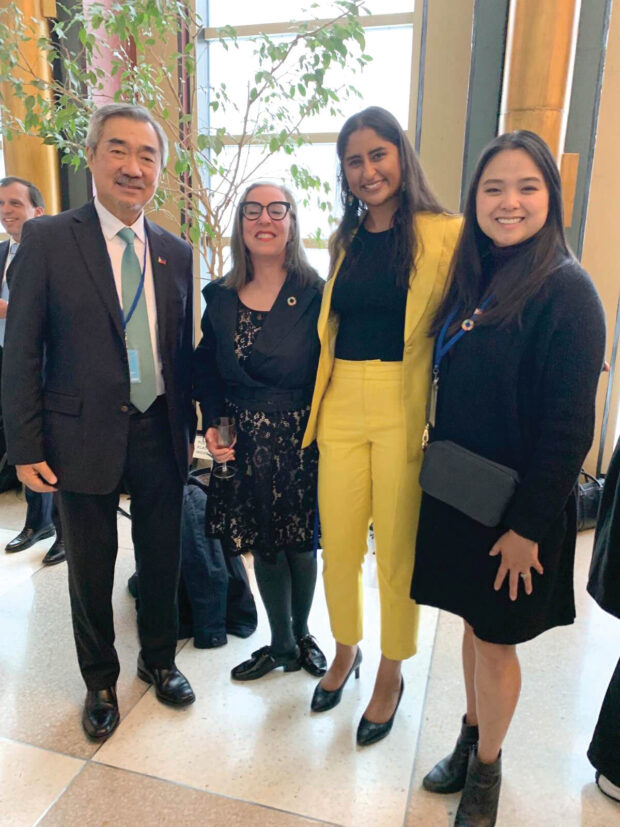
(From left) Hans T. Sy of SM Prime Holdings Inc.; Nicole Boothman-Shepherd, Vice President and Senior Director for Resilience and Recovery of AECOM; Nehali Anupriya, Analyst in the Sustainable Development Cluster of the Office of the President of the 73rd Session of the General Assembly
Midway into implementation of the Sendai Framework, where do we stand? The MTR SF comes at a critical moment given that disaster risk is rapidly rising, and is projected to reach 560 a year or 1.5 disasters a day by 2030.
“As risks are left unattended, disasters are materializing faster, surpassing our ability to cope, with increasingly dire consequences for people, livelihoods, society, and the ecosystems on which we depend,” said Mami Mizutori, Special Representative of the Secretary-General for DRR Head of the United Nations Office for DRR.
Through a political declaration, HLM representatives have recognized the need for “a broader and a more people-centered preventive approach” to DRR, wherein policies and practices need to be “multi-hazard, multi-sectoral, inclusive, and accessible.”
Information and involvement
Understanding that disaster risk is increasingly complex and systemic, delegates underscored the importance of information and management in DRR. 93% of Member States have reported improvements in this area.
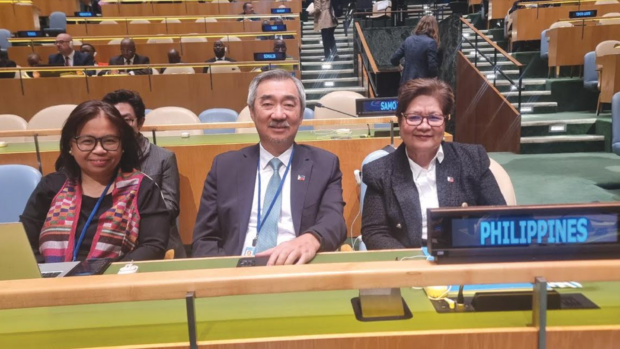
Leila Lora-Santos of the Philippine Permanent Mission to the United Nations in New York, Hans T. Sy of SM Prime Holdings Inc., Department of Environment and Natural Resources Undersecretary Marilou G. Erni
Likewise, many countries have identified public trust and public engagement as fundamental during crises. Efforts have been made to ensure DRR policies are not only understandable, but also actively engage the communities they aim to help.
The Philippine government, for one, has made significant progress in developing tools for risk assessment, including geohazard maps of and for cities and municipalities. In addition, training is provided to ensure that such maps can be used effectively in planning for disasters.
A partner in nation-building, SMDC pushes this forward through a disaster-preparedness training program of their own, “Ready To Rescue,” which aims to educate more Filipinos on climate risks, and equip them with the skills needed to be first responders in times of disaster.
Diversity and inclusion
Several human rights treaties have made it a point to ensure the meaningful participation of women, persons with disabilities, the elderly, and other priority groups in risk management and recovery.
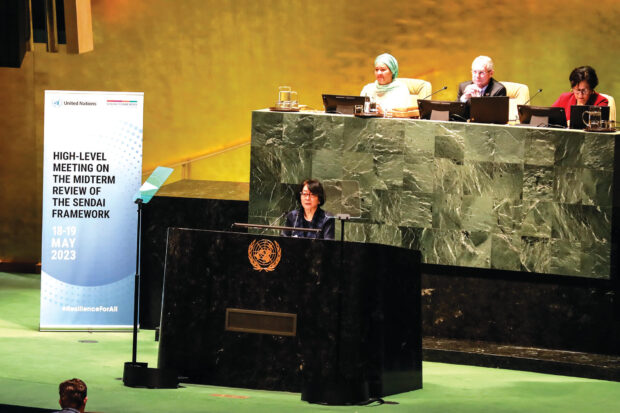
Secretary-General (SRSG) for Disaster Risk Reduction Mami Mizutori leads the plenary
These treaties not only allow underlying social norms and inequalities to be challenged, but minorities’ skills, knowledge, and experience to be leveraged. In the MTR SF report, many countries have reported an increase in efforts to prioritize and account for gender in disaster preparedness.
Locally, the SM Group has always advocated for women empowerment, gender equality, and inclusivity. SM Prime has signed the Women’s Empowerment Principles (WEPs) of the UN Women, and strongly supports the Women International Network for DRR (WIN DRR) Philippines’ Network. SM Cares, the corporate social responsibility arm of SM Supermalls, also has several programs specifically dedicated to women.
On the other hand, SMDC believes that social inclusion reduces people’s vulnerability to disasters, and provides a more full-proof approach to DRR. Their community-building programs on health and wellness, entrepreneurship, environmental stewardship, and employment aid in the protection of their communities.
Sustainable Finance
Most Member States have found that public sector budget allocations and expenditures for DRR have been significantly lower than other national development priorities. As such, globally, the private sector has increased its awareness and investments in DRR.
Countries have declared progress in fostering risk-informed business behavior in the private sector – incorporating risk into investment decisions, disclosing risk, communicating contributions to DRR, and ensuring workplace safety.
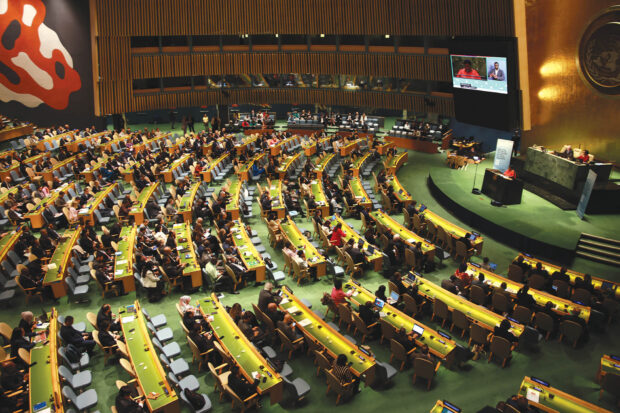
High Level Meeting on the Midterm Review of the Sendai Framework
At SM Prime, sustainable finance means investing in ways that add value for their stakeholders at the same time, yield significant environmental gains. “Being in business, we must carry the responsibility of safeguarding the surrounding environment – the earth we build on, the air we breathe, and the energy and water we use. The very resources that keep us alive compel us to do better for the community,” said Hans Sy.
Their investments prioritize nature protection and climate mitigation and adaptation. For instance, SM Prime maintains more than 50% of its electrical supply from renewable sources. Solar panels installed in 17 SM Supermalls have a 20.15 megawatt peak capacity. 25 malls have rainwater catchment basins. SM Prime’s supply chain is optimized by a rich database of suppliers and contractors that meet global environmental, health, and safety standards.
SM Prime has expressed that in the coming years, they intend to take their investments to the next level by taking an even deeper view of their financial streams, and building large-scale integrated property developments that further a low-carbon footprint lifestyle for many.
Early Warning Systems
Taking into account learnings from past disasters, governments have realized the importance of community-based early warning systems in disaster response. Evidence suggests that early warning systems help exposed and vulnerable populations reduce the negative impacts of disaster.
However, their effectiveness depends on individuals’ and businesses’ ability to act upon them. A strong proponent of socioeconomic resilience, SM has automated weather stations (AWS) installed in 48 malls nationwide. These AWS provide clean (solar and wind) energy forecasting, and five-day localized weather forecasting every 12 hours.
In addition, the SM Group plans to strengthen multi-sectoral collaborations with government and non-government organizations to reduce silos that hinder the timely and effective implementation of DRR programs.
Infrastructure
Investment in climate- and disaster-resilient infrastructure is a crucial part of post-disaster recovery. Member States agree that the UN Principles for Resilient Infrastructure should be placed at the heart of infrastructure development. This requires assessing the risk exposure, and performance of existing critical infrastructure, and integrating resilience as a core value in planning future projects.
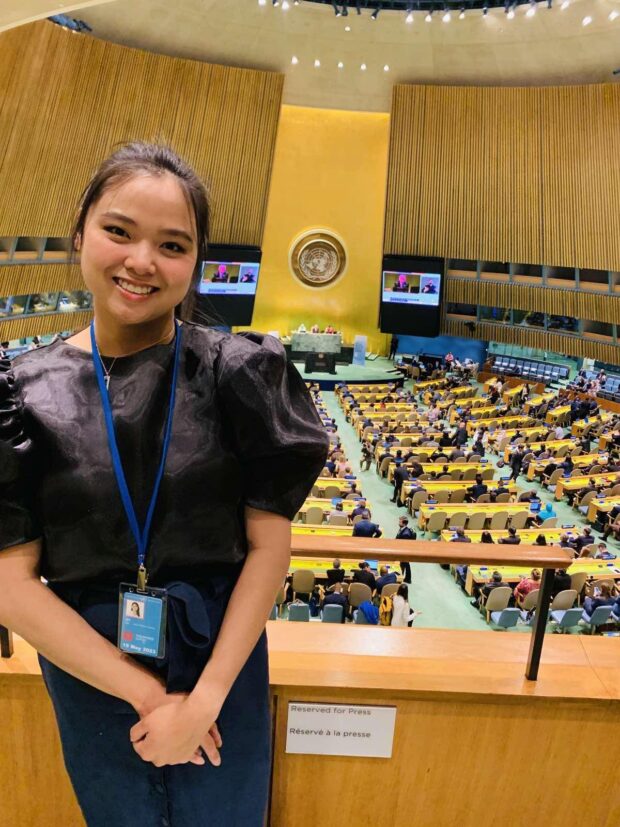
essica Bianca Sy of SM Development Corporation represents the Philippine Private Sector at the Leaders’ Roundtables on Resilient Infrastructure Systems.
Given this focus, the development of public investment mechanisms and incentive structures that facilitate investment in resilient infrastructure will be increasingly important moving forward. A builder of sustainable communities, SMDC has developed a number of communities across the country that take into account environmental, economic, and social sustainability.
“A sustainable community meets its present needs without compromising the future. We ensure that we provide a fully integrated lifestyle to our residents where they can thrive,” said Jessica Sy. SMDC developments are complete and integrated with commercial establishments, and are situated close to schools, offices, and transport hubs – making a sustainable, 15-minute city lifestyle more accessible to more Filipinos.
Similarly, SM Supermalls is improving accessibility and allowing more people mobility, while paying attention to environmental impact. To date, 28 SM Supermalls have charging stations for e-vehicles, and they have collectively provided over 14,000 kilowatt hours of electricity to over 750 electric vehicles for free. This project is in support of The Department of Energy’s Electric Vehicle Industry Development Act (EVIDA) Law.
Whole-of-Society Approach
At the end of the day, it all boils down to an “all-of-society” approach – to foster solidarity between countries and communities through broad, multi-stakeholder partnerships among governments, private sectors, the academia, and civil society organizations in understanding, analyzing, and responding to risk data.
The MTR SF seeks to push forth a resilient future, where the needs of people, society, and the planet are at the forefront. In the conclusion of the Midterm Review, Member States have renewed their “commitment to work across and align with various international agendas, particularly those on climate and biodiversity.”
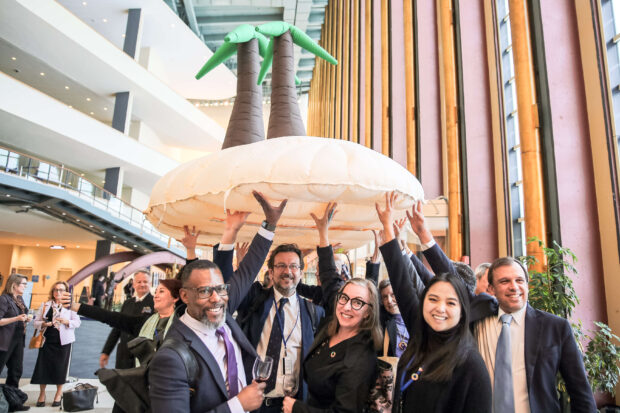
Jessica Sy, along with other UN Member State representatives, carry Søren Dahlgaard’s “The Inflatable Island,” a contemporary art piece that acts as a sculptural prop – representing refugees from Maldives and elsewhere who will most likely need to find a new home soon. It has travelled through many different countries, urging societies to push for radical transformation in order to adapt to the new conditions brought about by climate change and humanity’s impact.
“DRR not only makes good business sense, but is a shared social responsibility. The SM Group acknowledges that not one individual, sector, company, or country can do it alone, and that addressing disaster resiliency is everyone’s responsibility,” said Jessica Sy. She reiterated how as a company, the SM group is committed to place DRR as one of their core strategies, and to observe the ethical use of different forms of capital to help boost industries.
For almost three decades, they have helped Filipinos gain comfort, ease, and security by making homeownership more accessible, and offering economic growth through their commercial properties. “Coming from a developing country inevitably hit by the disasters brought about by climate change, it is important for the private sector and the government to find solutions for greater resiliency,” she added.
As one of the largest conglomerates in the country, the SM Group understands that risk-informed investments not only allow them to continue their business successfully, but serve communities better, increase their value, and be an asset to the government and society.
“Today disasters have been more frequent and severe. We, in SM Prime, understand our responsibility to develop our infrastructure with resilience in mind, incorporating sustainable practices and protective initiatives within our developments, which protect not only our own investments, but also our greatest assets – our communities,” said Hans Sy.
ADVT.
